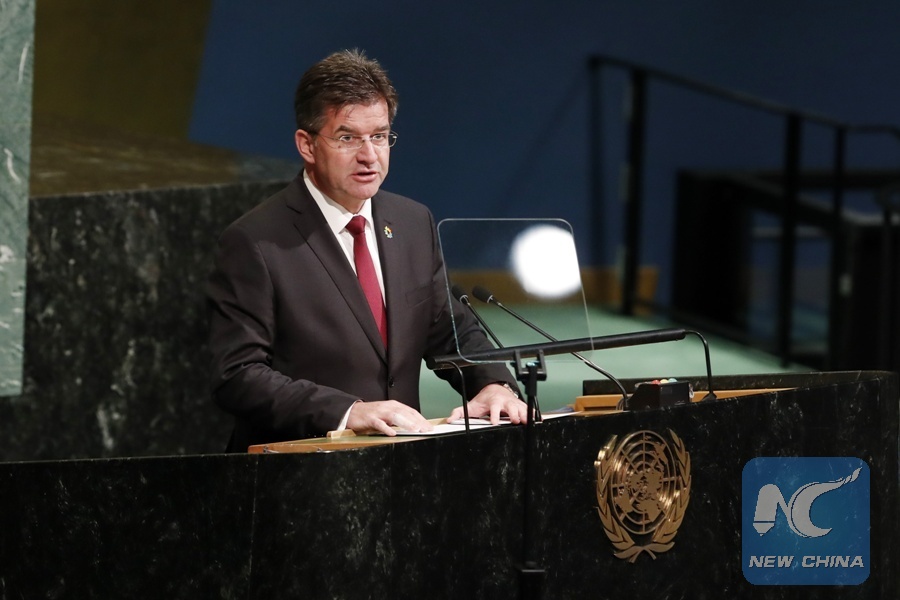
File Photo: Miroslav Lajcak, president of the 72nd United Nations General Assembly, delivers closing remarks on the last day of the General Debate of the 72nd United Nations General Assembly at the UN headquarters in New York, Sept. 25, 2017. (Xinhua/Li Muzi)
by Xinhua writer Ma Jianguo
UNITED NATIONS, Dec. 11 (Xinhua) -- President of the 72nd Session of the United Nations (UN) General Assembly Miroslav Lajcak said here Monday he welcomed the fact that China is now playing a leading role in the multilateral system and global affairs.
Lajcak said in an exclusive interview with Xinhua that China has already occupied a significant position as one of the five Permanent Members of the UN Security Council and has emerged as one of the main contributors to the UN budget and financing for development.
China's commitment to establish a ten-year-long, 1-billion-U.S.-dollar China-UN peace and development fund is particularly helpful, Lajcak said.
"I am also heartened by China's pledge to join the new UN Peacekeeping Capability Readiness System (PCRS) and take the lead in setting up a permanent peacekeeping police squad and building a peacekeeping standby force of 8,000 troops," he said.
The UN PCRS aims to liaise between UN headquarters and its member states to ensure "readiness and timely deployment of quality peacekeeping capabilities," said the system's overview.
Lajcak, who released a "Roadmap for Sustaining Peace" last month, said the purpose of the roadmap is to focus efforts and build momentum ahead of the high-level meeting on peace-building and sustaining peace.
The concept of sustaining peace is groundbreaking as it redefines the UN's approach to peace by adopting a long-term perspective and focuses on conflict prevention, he said.
He also said that the notion of sustaining peace stems from a growing understanding that the UN efforts should go beyond addressing the immediate needs of conflict-affected countries, he said, adding that to make peace last, each country like China should have its role to play.
China's involvement in the adoption of the universal and transformational 2030 Agenda for Sustainable Development was key, he said, praising China's job in establishing an assistance fund for South-South cooperation in support of developing countries' efforts to implement the agenda.
China was among the first countries to ratify the Paris Agreement and pledged 3.1 billion dollars to the South-South Cooperation Fund on Climate Change, which was an important move for developing countries.
Lajcak said that although multilateralism is being challenged, it remains the best approach to confront shared challenges and achieve joint success. In this modern era, countries cannot face challenges alone, he said.
"The United Nations should serve as a forum to address our common challenges. And it must also be a space to generate solutions for mutual benefit. This is the very essence of what the United Nations is about. We must position the multilateral system to better serve our people and deliver on their aspirations," Lajcak said.
People are not involved in the negotiation of resolutions, nor do they take the floor at high-level events, so it is one of the tasks of the General Assembly to make sure that their voices can still be heard, he said.

